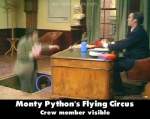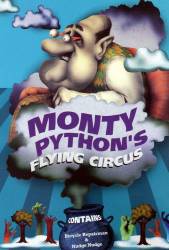Njorl's Saga - S3-E1
Audio problem: In the 'PC Pan-Am Gives Evidence' sequence (part of Series 3, Show 1), there is a loud, off-camera crash at 16'15", followed by hysterical audience laughter and a Palin visibly trying to stifle a laugh. This is because the heavily-bandaged 'Njorl', who had been replaced at that point by a dummy (enabling his head to be removed in the next scene), fell backwards off the podium, and had to be re-positioned by the crew. Filming presumably stopped, as a cutaway of Njorl appears in the middle of Pan-Am's address. The edit is also very audible, as Palin's speech suddenly plummets in volume.
Njorl's Saga - S3-E1
Deliberate mistake: Eric Idle's 'Stock Exchange Report' (in Series 3, Show 1) has a very obvious edit in the middle. This is a monologue delivered without cutaways, so the jump in the video tape is very easy to spot. Whether this edit indicates material removed or a simple joining together of two takes is unclear. However, since Idle gets drenched with water at the close of the routine (and given that, under BBC constraints, there was no time for drying out), we can assume that he must have made his fluff quite early on in the piece.
Mr. & Mrs. Brian Norris' Ford Popular - S3-E2
Continuity mistake: When Mr. Norris sets out on his expedition, it is April 24. But when we see his diary, the day is the 24th, but the month (on the top of the page) says "October."

Blood, Devastation, Death, War and Horror - S3-E4
Visible crew/equipment: When the Merchant Banker sends Mr. Ford through the trap door, you can see a crew member waiting to catch him below the stage. (00:06:50)
The War Against Pornography - S3-E6
Revealing mistake: When John Cleese (as Long John Silver) falls over after being shot with a tranquilizer dart, you can see his real leg, which was tucked behind him when using the peg leg. (00:20:10)
Salad Days - S3-E7
Continuity mistake: In the 'Sam Peckinpah's Salad Days' sketch in Series 3, Show 7, the scene suddenly changes from a bright sunny day to a pitch black night - this was apparently due to technical delays, but the effect makes it look like an extension of the 'pretentious director' parody.
The Nude Man - S3-E9
Other mistake: During the "Olympic Hide and Seek Final," Terry Jones, as the Paraguayan, has a little difficulty with his Spanish numbers. Besides mispronouncing many of them, he says "quince," the Spanish number for fifteen, instead of "cinco," the Spanish number for five. He actually has to pause to remember the Spanish number for fourteen, "catorce".






Chosen answer: Fortunately for the entire English speaking world, there is no translation. It is not real German.
jle